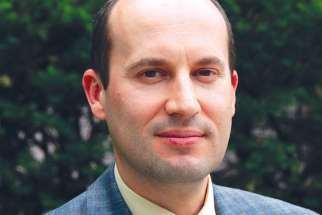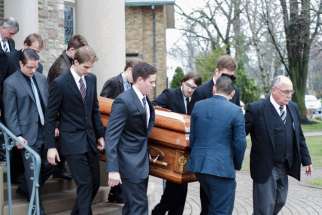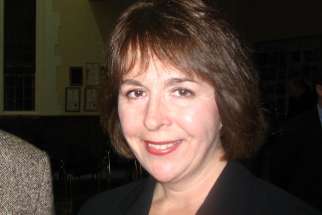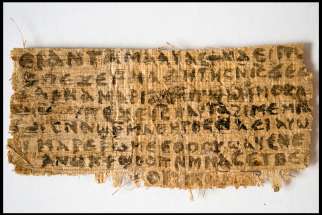Rights league chooses new executive director
TORONTO - The Catholic Civil Rights League of Canada has chosen Christian Elia as its new executive director.
TORONTO - Joanne McGarry was a lot of things to a lot of people — an advocate for Catholic civil rights, a Catholic journalist and a dedicated colleague to some, to others always be a dear friend, loving wife and caring mother of three. Now to all she is an angel in heaven.
TORONTO - A voice committed to faith and fairness has been silenced. Catholic Register columnist and executive director of the Catholic Civil Rights League Joanne McGarry succumbed to pancreatic cancer April 28. She was 60 years old.
Easter ‘news’ follows a predictable pattern
Earlier this month, the international wire services carried a story involving a fragment of papyrus written in Coptic that suggested Jesus may have referred to “my wife” in speaking to a group of followers.
Free speech everywhere but Parliament
The late-March decision to declare Private Members’ Motion-408 “unvotable” has generated a debate about the control of party leaders and the Prime Minister’s Office over what Members of Parliament can and can’t say in the House of Commons.
Whatcott case leaves troubling concerns
The recent Supreme Court of Canada decision in the case of anti-gay advocate Bill Whatcott provided troubling answers to some questions concerning free speech but improved the language of a provincial human rights code and slightly raised the bar for future cases.
University law school raises questions about religious freedom
When it become known in January that Trinity Western University (TWU) was seeking accreditation for its law school, newspaper columns and letters pages almost immediately erupted with opinions about why the school should, or should not, be trusted to train lawyers.
Catholics Come Home sparks debate, interest
Among the most ambitious media outreach programs in recent years involving religion is Catholics Come Home (CCH), an independent, U.S.-based, non-profit Catholic apostolate. Founded in the late 1990s, it creates media messages to invite lapsed Catholics back to church and to inspire and educate others, including non-Catholics, in religious knowledge in keeping with the magisterium.
After 33 American campaigns, CCH has begun its first Canadian outreach, in the dioceses of Vancouver and Victoria. While the campaign is bigger than TV advertising — parish welcoming committees, special events and other outreach initiatives are also important — the media component tends to attract the most attention.
Such was the case in The Globe and Mail on Jan. 3. In a column titled “Does Catholics Come Home campaign have a prayer?”, Gary Mason gave his assessment of the “controversial” program, complete with lots of detail about his own lapse from Catholicism and his view of what the Catholics Come Home program is likely, or unlikely, to achieve.
Citing Archbishop Michael Miller’s estimate that a quarter million Catholics in the archdiocese are no longer practising their faith, Mason rather cynically estimated that if the campaign enticed even 10 per cent of them back, “that’s nearly 25,000 new(ish) parishioners and a far heavier collection plate. And you’d certainly have to think that declining revenue is playing some sort of role in this membership drive.”
In fairness, the article also included some thoughtful insights on why church attendance is down, and not only (or even principally) in the Catholic Church, including lack of interest, lack of time, a perception that the Church needs to get with the times, teachings on sexuality that many do not accept or find difficult, and the sex abuse scandal. Of course many people raised in the mainstream Protestant churches have also stopped attending. The only difference I’ve ever noticed is that most of them continue to identify themselves loosely with the tradition in which they were raised.
I’ve visited the Catholics Come Home web site and viewed the TV spots, which discuss charitable and educational works, sacramental life and community life. I think the only people who would regard the package as controversial are those who regard the Church itself as controversial. Evangelization is part of what Christianity is about. While there will always be legitimate questions about one outreach program or another, there’s no getting around the fact that attempting to share the Good News is a good and necessary thing, provided it’s done with respect and courtesy.
The CCH cites American evidence to demonstrate the need for outreach, but the data is comparable to Canada. No more than a quarter of adult Catholics attend Mass weekly. The number of Americans identifying themselves as “unaffiliated” with a religious tradition continues to increase dramatically, and now makes up more than 15 per cent of the population.
Despite the growth of the Internet and social media, television continues to consume a huge proportion of our entertainment time, with the average Canadian household tuning in for 24 to 26 hours a week. Even though youth spend more time glued to their iPads or computer screens, they are often using them to watch television shows.
CCH founder Tom Peterson is kinder than many people about media coverage of the program, and religion in general. According to the B.C. Catholic, he says that despite some negative reporting, most of the media realize the good work of the Church in the world.
“We can’t take the credit, but we can thank the Holy Spirit, for starting hospitals and universities, and for being the largest charitable organization on the planet.”
He added that he enjoyed talking with the Canadian media about the Vancouver initiative when he was visiting in October, stating that Canadian journalists showed respect and kindness even when asking tough questions. Local coverage of the CCH program included criticisms, but has been generally well-balanced.
Advertising on television or elsewhere is only a tool. The content of any ad is unlikely to sway people who have already been well and truly “turned off” by an institution or product. For the sizeable group who have drifted away from Church for no particular reason, however, this type of program may be effective in re-igniting interest.
The CCH claims their program results in attendance bumps of 10 to 18 per cent. Whether these gains are sustainable is more difficult to document. But the initial surge of interest sparked by the CCH program is important and shouldn’t be discounted.
(McGarry is Executive Director of the Catholic Civil Rights League of Canada.)
Christians resigned to media bias
This is a column about what happens (or doesn’t happen) when Canada’s publicly funded broadcaster mocks Jesus Christ on prime time TV and a no-name amateur filmmaker mocks Mohammad on the Internet.
Throughout September, deadly violence erupted in many parts of the world as groups of Muslims attacked American embassies and other installations after a low-budget video, called The Innocence of Muslims and posted on YouTube, depicted the Prophet Mohammad as a fool and a sexual deviant. In Pakistan, at least two six-figure bounties have been offered, one by a current government official and the other by a former one, to be paid upon the death of the filmmaker. The filmmaker himself is currently being held in a Los Angeles detention centre, reportedly for parole violations.
In Pakistan, at least 23 protesters have been killed. There were also deaths in several other Muslim countries. The violence coincided with an attack on the U.S. diplomatic post in Benghazi, Libya, that killed four people, including the U.S. ambassador.
Meanwhile, on Sept. 28 the CBC program This Hour has 22 Minutes broadcast a skit based on Leonardo Da Vinci’s famous painting of the Last Supper. It used the tableau as a backdrop to satirize recent news reports of writings on a papyrus fragment that allude to a wife of Jesus. (The fragment is of disputed origin and there is certainly no agreement among scholars that it refers to Jesus Christ.) In the skit, a woman identified as Jesus’ wife is shown continually disrupting the Last Supper, complaining that Jesus is constantly carousing with the boys and drinking too much wine. In a particularly offensive segment, the familiar words of the consecration (“This is my blood…”) are interrupted when the Jesus figure complains: “Ellen, do you mind, I’m kind of in the middle of something.”
Although both are offensive, the two videos are different in many respects. But perhaps the most striking difference was not the video content itself but in the respective response from Muslims and Christians. In the first case, we saw violence that we would normally expect only in conditions of war or civil uprising; in the second, there were probably a few hundred groans as many people reached for the remote and perhaps a few dozen angry e-mails and phone calls to the CBC.
The Catholic Civil Rights League has tried over the years to lead the way in protesting serious anti-Catholic media portrayals. I am often asked why the typical Catholic response is usually so tame, if one happens at all. Obviously, there is a cultural factor. North American and European Christians live in free-speech societies and in environments where religious differences tend to be accommodated and where religion is downplayed in a secular public atmosphere. This doesn’t make it right to mock religious beliefs as though faith was just another form of entertainment, but it probably does mean that when it happens Christians regard it more as tasteless humour than a serious attack.
More than likely, the people who send e-mails or make phone calls to complain know that change is unlikely. These complaints won’t reverse the ingrained biases of society and the media.
The CBC’s lampoon of the Last Supper was far from its most serious example of anti-faith bias. No one would take the skit seriously. Some of the false impressions created by the CBC and other networks over the years by their slanted coverage of the sex-abuse scandals, or in police dramas where violence at abortion clinics always seems to have a Catholic angle, probably do more to perpetuate anti-Catholic bias.
Perhaps Catholics, and many other Christians, have stopped paying much attention to the media because the bias is rampant or because they believe any harm done falls short of egregious. While some of the worst South Park episodes, such as those involving a bleeding statue of the Virgin Mary or a depiction of Jesus Christ who could not perform miracles, drew sharp responses, including boycotts, most people responded by simply watching something else.
This may well be part of the reason that the media continues to take liberties with Christianity that they wouldn’t dare take with Islam. Christians seem resigned to the insults.
No one wants a world in which violent responses are the norm, but a short e-mail or phone call in protest of anti-religious bias can let producers and advertisers know they’ve lost some audience. As media executives and politicians both attest, it’s an issue if they hear about it, and if they don’t, it isn’t.
(McGarry is executive director of the Catholic Civil Rights League.)
New school year, and trouble’s brewing
Bound to be further developments for parental rights, religious freedom
Parental rights and religious freedom in schools have been under the microscope in Canada’s two largest provinces over the past year. The arrival of a new school year is bound to bring further developments.
Let’s begin with Quebec, where parental objections to a mandatory school course led to a Supreme Court of Canada challenge. In 2008, Quebec introduced a course called Ethics and Religious Culture to replace existing courses in religious and moral instruction being taught in Catholic, Protestant and non-sectarian elementary and secondary schools. The curriculum change affected both public and private schools.
All children were required to take the new course. That prompted two parents, supported by a group of many more, to bring a case in Quebec Superior Court when requests to exempt their children from the course were denied. The parents argued that the mandatory course violated their religious convictions because it taught relativism — i.e. all religious beliefs are equally valid — and this conflicted with their Roman Catholic beliefs.
Roughly 2,000 applications for exemptions had been submitted by Quebec parents. All were refused. Some parents removed their children from the class anyway, despite the threat of sanctions, including suspension of the students.
By refusing to make the course optional or allow exemptions, the state essentially foisted one belief system on students and their families. Polls have consistently shown that more than 70 per cent of Quebeckers believe parents should be allowed to withdraw their children from the course and also have the option of enrolling them in traditional Catholic or Protestant religious instruction.
The case found support among a number of religious and civil liberty associations and was appealed to the Supreme Court of Canada. But the appeal failed. The high court ruled in February 2012 that Quebec school boards did not have to grant exemptions, stating that parents had yet to prove that the new course interfered with their right to religious freedom.
In effect, the court asserted that all Quebec parents (including the more than 2,000 parents who sought exemptions) must first expose their children to the new course and obtain evidence for their concerns. After gathering evidence, they could then re-start the process of seeking an exemption from their local school board. The Supreme Court left open the possibility of re-hearing the application, but only if it could be based on evidence to support the parents’ concerns. Still, a ruling that permits the state to impose a mandatory course on religious topics sets a troubling precedent that could be applied in other provinces when parents try to assert their rights.
The next challenge could come in Ontario, where Bill-13, the Accepting Schools Act, became law in June following considerable input from parent and education groups. Presented as a strategy to combat bullying in schools, Bill-13 amends the Education Act to require schools to implement strategies to document and reduce bullying, and discipline the bullies.
While all parent and school groups endorse efforts to combat bullying, many are concerned that Bill-13 focusses on bullying based on sexual orientation. The preamble to the bill introduces the notion of gender as a social construct to include the “LGBTTIQ” categories of sexual orientation (lesbian, gay, bisexual, transgendered, transsexual, two-spirited, intersex, queer and questioning).
In perhaps the most controversial provision, the bill says all schools, including Catholic schools, must permit clubs called Gay-Straight Alliances if students request them. Opponents to the bill contend that the focus on concepts that conflict with a Catholic understanding of sexual morality challenges a constitutional right to allow Catholic schools to teach Catholic values.
Most Catholic educators and parents recognize that Bill-13 cannot be implemented in Catholic schools without clear and consistent provisions to ensure anti-bullying clubs and other activities conform to Catholic teaching. During the legislative process, Catholic trustees, educators and bishops developed a policy called Respecting Difference to address bullying in all its forms, including bullying based on sexual orientation.
The policy requires anti-bullying clubs to be guided by knowledgeable and committed staff who can address student needs while remaining faithful to Catholic teaching. That has created the potential for conflict with leaders in the gay rights movement, who have indicated that they may initiate legal proceedings against Catholic schools.
Vigilance and involvement by Catholic parents and educators is vital in supporting anti-bullying initiatives that allow all students to feel safe and welcome while at the same time ensuring that Catholic denominational rights are protected.
For Michael O’Brien, faith is life
TORONTO - The Catholic Civil Rights League has named Michael O’Brien, a world-renowned Canadian author and artist, the 2012 recipient of the Archbishop Adam Exner Award for Catholic Excellence in Public Life.
This annual award recognizes “outstanding lay achievement in advocacy, education, life issues, media and culture, and philanthropy.”








